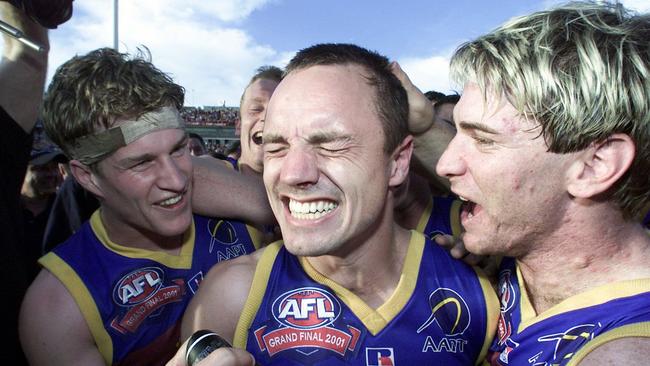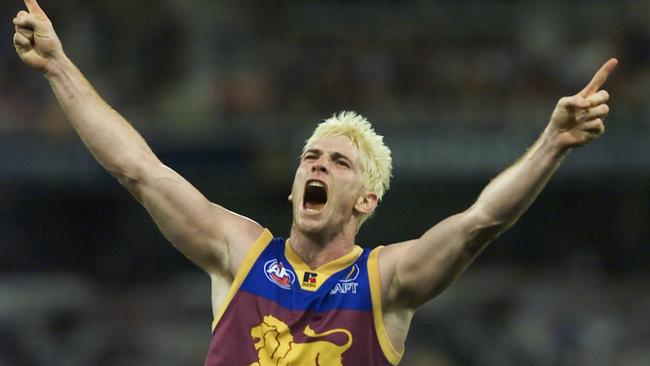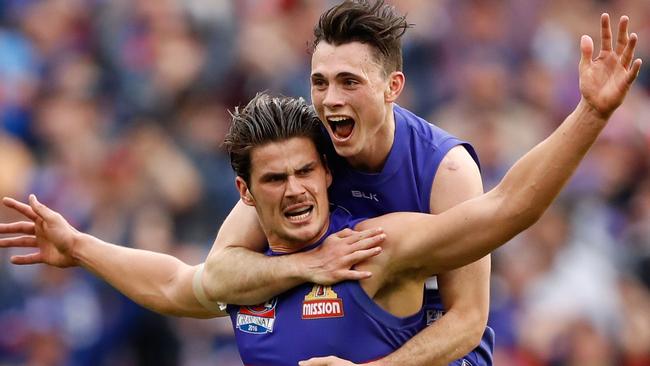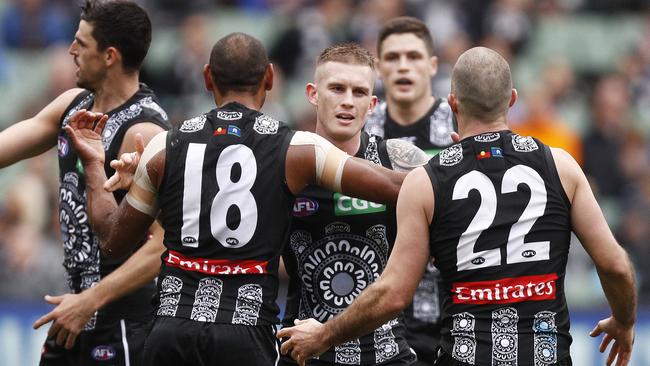Jason Akermanis gives a unique perspective on mental health in the AFL
Australian rules at the elite level is hard, but so is life. Retired star Jason Akermanis dives into the real world of mental health in the AFL and takes a look at how real the issue is for athletes. And he’s taken aim at a renowned AFL psychology program.
Expert Opinion
Don't miss out on the headlines from Expert Opinion. Followed categories will be added to My News.
Is it real? Is it an industry wide problem with little improvement? Or is it a tool for escape, manipulated by players to take an easier option?
There is little doubt about some parts of human psychology that can be a dark place to enter.
The invisible monster of our time to some. To us older, ex-professional Australian rules players it is called ‘part of the game of life’. If game is the correct term. More likely the grind of life.
In writing this article on this mental issues subject I have called in some help. To offer people within the industry and in general life a different point of view and to understand what a real professional thinks with more than 50 years in dealing with athletes and people from all kinds of life experiences. I have called in a professional performance psychologist Dr Phil Jauncey.
Dr J would tell me all the time, ‘When people speak of having emotional issues, what they mean is that their brains are giving them pain. Our brains have been programmed in such a way that if what we are doing is not working, the brain will give us pain. The moment we try to improve things (fix it), the brain reduces the pain and gives more energy to help in the solution’.
Relive classic AFL matches from the 60s to today on KAYO SPORTS. New to Kayo? Get your 14-day free trial & start streaming instantly >

Two high profile examples within the AFL I think are noteworthy are; Dayne Beams and Tom Boyd.
No doubt both examples are different in many ways.
Tom Boyd gave up millions of dollars and opportunities he could have only dreamt of as a teenager. Mental health was costing too much and the decision was made to move away at the ripe old age of 23 for a quieter life outside the world of the AFL.
Just as complex is the curious case of Dayne Beams. A car crash on his birthday on February 12th has, in many AFL journalists’ opinions, ended his AFL career at Collingwood. It looks to be a sad story of a player who has finished too early from something he loved and was destined to follow.
Firstly let me state as a past player and fan of our great game that ‘mental health issues’ is a broad term. It serves as a cover for the real issue without actual understanding what a player is specifically dealing with.
Professional sport is hard. Really, really hard. The game itself is the ultimate test for any human in the world of contact field sports. As a field sport, nothing can compete with the sheer mental and physical demands. So much so that in Australian rules football there is always something to work on. No Michael Jordan’s ‘I am bored of winning’ here. It is tough and relentless.
Experts say that the same attitude and behaviours that make elite athletes such as Tiger Woods so good is the same destructive force for constant improvements that can leave them unsatisfied.
Dr J uses the analogy of the four major food groups. “If we do not healthily ingest all four types, our body gives us pain, telling us what we are doing is not working”.
In life, he states “we have five life sustenance groups – mental, physical, emotional, social and spiritual. Often in sport, athletes get so caught in the first two, that they starve themselves of the other three’.
Things have changed though within the athletes of this generation. It seems gone are the days of delayed gratification. Everything now is nearly instant. Need a map to get somewhere? It’s right in your hand. No Melways or refidex, as it was called in Queensland, in sight. Want a lift? Easy. Want a pair of boots? Order it online, easy. Want to know something? Even easier.
To me, it seems social media isn’t that social at all. Access to players is much easier than it has ever been. But, so is the instant hate and instant feedback from opposition fans, their own religious club fanatics, trolls and haters.
It has never been easier to have our own self doubts bubble up to the surface ready to help us see the evidence we need to berate ourselves in our own minds.
Considering that experts say that emotions on average last around 90 seconds, today’s open mental issues seem at odds with the reality of human history of the battle of our minds.
AFL land has also been vulnerable to mental abuse from amateur pop psychology programs such as the much publicised Leading Teams. A program run like the military style model its founders came from. These programs operate without trained experts and were, in my opinion, always going to end in disaster.
It is a program that left many players, including myself, in total bewilderment as to the actual goal of the program other than good communication between coaches, players and teammates. Strange when you think that this should be a given from skilled coaches employed at this elite level of professional sport.
Thankfully, I was lucky. The Brisbane Bears and Brisbane Lions had a true professional performance psychologist in Dr Phil Jauncey. I can’t count the number of times in my 12 years at Brisbane that I would walk into his office in complete shame and guilt about myself, my game and my mind.

Within 20 minutes he had me turned around and I was walking out the door ready for the next battle with the opposition and my over active mind that was part of my personality. He didn’t just help me with myself but helped others understand my personality. He worked with players, coaches and our partners to build understanding of each other which enabled us to work together.
He still helps me today. Having our club and, in particular, AFL legend Leigh Matthews agreeing for Dr J to work with us was a true blessing of enormous magnitude. You throw in the amazing work of great mate and Lions former club physiotherapist, Victor Popov, and my mind influences had my body and mind in a good place.
Victor would tell me what he knew, what I could do and what my body was about to do. His years of experience with Sam Riley in swimming, Robbie McEwen in cycling plus a plethora of Olympic athletes, gave me the belief that what he was saying was spot on. Our friendship is even stronger today.
My experience of Leading Teams was just the opposite. I left their sessions mentally confused with no idea about the plan I needed to fix any supposed issues others may have had.
To be honest most of the feedback said more about the players saying them than actually about helping their teammates.
Back to Beams and Boyd.
Tom Boyd’s career is a great test case for the reality of life and football. You can bet Tom was told about his talent from just about anyone who wanted a piece of him growing up. His parents would have been told of his talent and future prospects in the AFL. His prospective mangers would have told him he was going to be a star. And he was a talent. Drafted into the AFL expansion team GWS at pick 1 in 2013. It was the evidence he needed to see for himself following the many years of constant talk.
After a couple of years in the GWS/AFL system, the deal of a lifetime to the Western Bulldogs came through the trade period in 2014. Coupled with the unbelievable trade of Bulldogs captain Ryan Griffen, due to his own mental battles with his then coach Brendan McCartney, it made for a pressure packed scenario.

Griffen survived by mentally releasing the pressure by moving to a low stress, low expectations club in GWS. Tom moved south on a monster million dollar deal. While the pressure shifted from one to the other, Tom would have to, for the first time, deal with something other than getting drafted with talent. Real mental pressure from external expectations at a Melbourne based club.
The reality for Tom was everyone wanted to talk about the enormous sums of money the Bulldogs had invested in him. The pass mark for his performances was now sky high. His performance in the 2016 Grand Final was supreme. A mighty game that should have seen him win a Norm Smith Medal. I would doubt he, or any Bulldogs fan alive, will forget it ever.
Professional sport is a cruel love. For most of the year feedback is immediate. From training vision to matches week to week.
The harsh reality is that pro athletes are akin to a bag of eggs bashed against a wall. The ones that don’t brake physically and mentally survive and the rest end up on the scrap heap. As I said, it is hard.
The Dayne Beams situation is touchy to say the least.
People will have various theories on why life has been tough for him but nobody really knows.
Which poses a small problem. How can we work on a solution or learn lessons if we actually don’t know what is really going on?
Collingwood had done him a favour by helping Dayne in moving back to Queensland to be with his terminal ill father Philip.
The Brisbane Lions had done the right thing by him in trading him back to Collingwood after a couple of years with Brisbane including being their captain and after his father’s passing.
Even after Dayne said to teammates personally that he wasn’t going anywhere.
In the end Brisbane and Collingwood have done the right thing in what is a rare understanding of an athlete and his precarious mental state at times.

Dayne’s “mental issues” are, in my opinion, are a generalisation that does not focus on the true cause of his pain.
He apparently needs to do some self-investigation with the help of a professional. While we all want to conquer our inner demons, what I would like to see is an action plan.
Dr J’s take on world’s number one Aussie tennis player, Ash Barty is:
“Ashley Barty had this problem. She had issues with her tennis career and took time off.
“Fortunately for her, she got into a cricket team environment where her deficit areas were replenished. When she went back to tennis, she made sure that in her touring party, activities and schedule, all five groups were present.
“She took along family and support staff, she still kicks the Sherrin and bats and bowls, does various community activities, as well as normal tennis preparation. Thus, when an athlete says they need to take some time off because of emotional issues, they need to find the cause of the pain and put a FIX in place. Without knowing the cause, one cannot find a cure”.
In the end clubs at elite AFL levels should be able to spend money outside any AFL cap on these type of professionals.
Sports and performance psychologists should be employed for each AFL and AFLW team.
Although professionals rely on academic literature to inform their practice, the players within the AFL and AFLW have needs that are particular to their sport and are often at the forefront of innovation.
MORE AFL
Sam Groth column: AFL players can play a role in crisis by moving to hubs
Players unfairly targeted after AFL delivered its radical restart proposal, writes Mark Robinson
Gary Buckenara column: How to fix ‘broken’ VFL to create real junior talent pathway
The AFL and AFLW competitions should have at least an annual meeting of their club professional psychologists so that experts like Dr Phil and others can talk openly about the decades of experience so that less experienced Performance Psychologists can learn from to then implement tried and proven methods into their own body of work to help our athletes now.
As it stands, the AFL clubs contain a smattering of professionals with varied times and commitments at each club.
Clubs must become clear on what is happening and implement appropriate psychology management plans moving forward.
If they don’t, stigma and scuttlebutt will continue to develop and mental illness and issues will be a mystery for us all and an excuse for some because it has gotten too hard.
Australian rules at the AFL level is hard but so is life. Use the professionals and allow players to manage their mental health issues and stop the frauds from making it worse.
– Jason Akermanis with Dr Phil Jauncey
